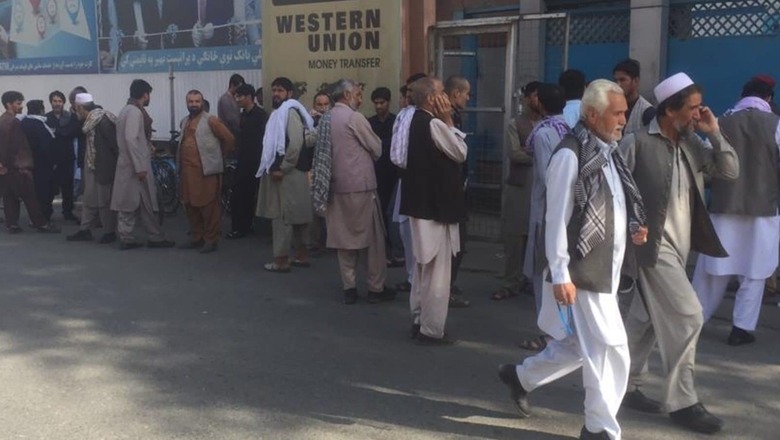
views
Losing his composure while pining for the old days, 33-year-old Shahidulah Zadran, one of the natives of the Khost province on the eastern part of the Taliban-captured Afghanistan, on the evening of August 30 visited an internet cafe in the local Hammam Market to download into his cellphone a few newly released Bollywood and Hollywood films and songs. He had finally surrendered to repeated requests of his wife and children who have mostly been spending their time locked in their house ever since the armed militia’s takeover.
On that day, less than half an hour past Zadran’s arrival at the busy market that reflected a noticeable absence of women shoppers, a group of armed Talibs led by their commander swarmed the internet cafe that he was to visit. Unquestioned, as the men waded through the local gathering, the other visitors silently gave way. The Talibs zeroed in on the cafe operator and captured him. They snatched away his computer and other equipment and took them all along in their pick-up truck.
As they left, they shut the cafe. The onlookers, locals residents and passers-by were warned to not dare to watch any Bollywood or Hollywood film or play any music aloud.
As the savagery unfolded, Zadran stood there as a witness. Speaking to CNN-News18, he said he was told that they took the cafe operator and his computer to the police headquarters building that now is under the Islamist force’s control. “No one knows what happened to him. I had gone there to download Akshay Kumar’s latest movie Bell Bottom on my phone. Like any other family here, mine too loves to watch Bollywood actors. My children like Akshay Kumar among other Indian actors such as Shah Rukh Khan and Amitabh Bachchan. They dance to the tunes of Hindi songs,” said Zadran.
According to the locals, Bollywood songs are much adored, particularly during wedding ceremonies. Like any Indian city, in Afghanistan too, people love to dance to the tunes of Hindi chartbusters. Over the past month, however, since things have fallen haywire under the militia’s regime, playing aloud and rejoicing to the beats of Hindi songs have become a thing of the past.
“Last week there was a wedding ceremony in my village. Unlike earlier, it was wrapped up before sunset. No music, no dancing, no feasting. People are really scared. The way we used to enjoy our lives has changed. It doesn’t feel like we are in our own country anymore,” said Zadran.
Zadran lives in Khost, roughly about 250 kilometres from Kabul, with his parents, wife, brother and his two children. He describes the incidents he has recently been witnessing as petrifying but not uncommon.
“Every other person we talk to has similar encounters to narrate. Such atrocities have become routine. Talibs often raid houses in our village. They are mostly on the lookout for those who earlier served in the Afghan army or in the police. They seize their weapons and assault them in front of their families, warning them not to dare to rise against their command,” he told CNN-News18.
But social and personal life isn’t all that has been altered. At a time when not all men are going to work out of fear, limiting the family income, prices of commodities of daily use have significantly surged.
“Oil, milk and rice are the three basic items that have seen price hikes. Earlier, if oil was available for 1,500 Afghani (local currency) the price has now gone up to 2,200 to 2,500 Afghani. The same is the case with rice and milk. The prices have almost doubled. It is distressing as these are items of basic need. We all have children who require milk and a proper diet,” said Rahmat Shah, a resident of Karte Naw district in Kabul city.
The 25-year-old man, an engineer, who lives with his father, brother and sister-in-law, says the inflation is primarily because of a shortage of goods in the local markets. “What we have learnt is that imports are affected, impacting the local supplies. Many people have also hoarded ration and other eatables as they feared the markets wouldn’t open for long. Everyone is scared. There’s so much uncertainty that we do not know what will happen to us the next day,” he told CNN-News18.
Shah said that banks too haven’t opened since the Talibs dethroned the Afghan government, as a result of which families are running out of savings. “For those who do not have adequate savings, we wonder how tough would survival be,” he said.
What’s worse, the residents say, is that medical stores are also reporting shortages. Zadran, from Khost, added that when he had fallen sick about two weeks ago, he realised that pharmacies too are charging more than the maximum retail price because certain medicines are not sufficiently available.
But apart from these ordeals, residents of Afghanistan, be it from the capital city of Kabul, or Khost province, or people from Ahmad Shah Baba town 13 kilometres from the capital, say that the elaborate decree of restrictions from the Taliban is what has pushed them towards a dark age, leaving them in uncertainty.
A resident of Ahmad Shah Baba town said the farmaan (decree) issued by the Taliban has pulled them years back in time. It’s not just getting a shave, to wearing modern clothes and listening to music that has been barred. The list includes that women will always wear a burqa and men will sport a pheron, no breeding of pigeons, obligatory praying at mosques whenever called for, no use of drugs, men won’t sew women’s clothes and no wearing of jeans, he said, requesting not to be named.
“The women have been told to not visit the city markets unaccompanied by their men. They have been told to not engage in work or higher studies. During the initial few days, the Talibs would roam on the roads, right across our house, armed with machine guns and other weapons. They would shout, fire in the air, to terrorise locals. They even now often enter houses and thrash the residents. For at least the first 15 days, my five daughters, three sons, wife and I lived under a strict lockdown fearing these armed assassins,” he told CNN-News18.
The man, who works for USAID, said he too had planned to flee his country during the initial unrest following the Taliban’s capture of Afghanistan, but says he couldn’t obtain the visas.
“The day I had visited the visa office, multiple groups of armed men barged in and shut it down. They drew all of us out of the building along with the staff and closed the office. Thankfully, they didn’t fire or kill anyone,” he narrated.
However, despite these ordeals, restrictions, terror, uncertainty and threat, not all Afghans want to leave their country.
25-year-old Hafiz from Kabul, who refused to reveal his surname to keep his identity hidden, said they feel dejected and betrayed by other countries.
“There are such powerful nations who are able enough to throw the Taliban out of power. But none came forward. Despite knowing everything, they’ve all left us to our fate. So many have died and many more will fall. I fear for my family and loved ones. I lost my mother a few years ago,” he said. “This country is my mother and no matter what, even if we are heading towards the darkest time of our life, I will never leave my motherland.”
Read all minute-by-minute news updates for Uttar Pradesh election results 2022, Punjab election results 2022, Uttarakhand election results 2022, Manipur election results 2022, and Goa election results 2022.
Click here for seat-wise LIVE result updates.




















Comments
0 comment